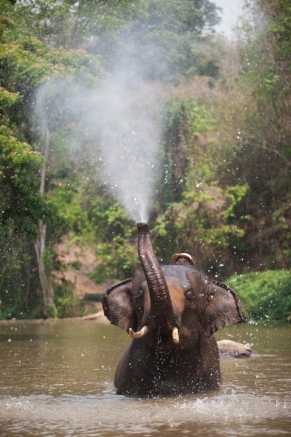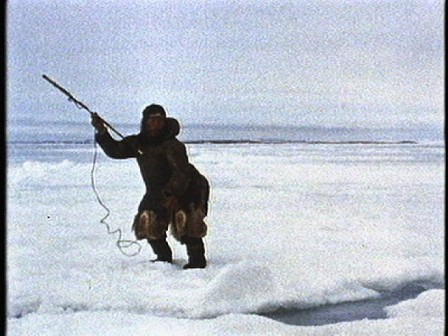Part I: Language and Affect
In The Spell of the Sensuous, David Abram utilizes Maurice Merleau-Ponty’s work to characterize language as an expressive and gestural outlet of bodily experience as opposed to a coded abstract representation. He quotes Merleau-Ponty: “I do not see anger or a threatening attitude as a psychic fact hidden behind the gesture, I read anger in it. The gesture does not make me think of anger, it is anger itself.” Abram adds:
Communicative meaning is always in its depths, affective; it remains rooted in the sensual dimension of experience, born of the body’s native capacity to resonate with other bodies and with the landscape as a whole.[1]
Language, as a combined oral and gestural form of interaction, thus contains this affective quality, and it is affection itself that potentiates sentiments of affinity among social animals. In other words, that we affect each other reveals an aesthetic capacity that encourages localized cooperation. It is exactly this affective quality that becomes manipulable with the introduction of formal socio-economic structures, as individual agency within a social group is co-opted and centralized in the form of institutional power. As such, practices of systematic coercion– both direct, such as slavery, and indirect, such as propaganda– become possible. Therefore, to control language is to control a population affectively, often in addition to, but also at times in replacement of, more physical modes of control.
Pre-alphabetic language, being completely oral and gestural in its expression, maintains a limited potential for control, as opposed to alphabetic language that reduces expression to a set of standardized man-made symbols. Suddenly, what was once formless and diverse could then be written, reproduced, and spread in the interests of power.
Part II: The Story
In his 1936 essay The Storyteller, Walter Benjamin focuses on the transition from oral storytelling to the production of written novels. He writes:
The earliest symptom of a process whose end is the decline of storytelling is the rise of the novel at the beginning of modern times. What distinguishes the novel from the story … is its essential dependence on the book. The dissemination of the novel became possible only with the invention of printing. What can be handed on orally, the wealth of the epic, is of a different kind from what constitutes the stock in trade of the novel. What differentiates the novel from all other forms of prose literature … is that it neither comes from oral tradition nor goes into it. This distinguishes it from storytelling in particular. The storyteller takes what he tells from experience—his own or that reported by others. And he in turn makes it the experience of those who are listening to his tale.[2]
Two things happen here: first, the power retained in the act of storytelling is curtailed. To Walter Benjamin, storytelling is a unique skill that facilitates “the ability to exchange experiences” both between individuals and inter-generationally. By extension, storytelling provides what he calls “counsel”, described as “less an answer to a question than a proposal concerning the continuation of a story”. If wisdom is, as Benjamin writes, “counsel woven into the fabric of real life,”[3] then storytelling is the practice by which particular social groups remain autonomously in control of their own personal narratives and realities. The novel diverts this process, mediating self-determined storytelling and reflecting a more generalized modern logos. Secondly, the skill of storytelling falls out of practice, and the experiences of diverse peoples and generations are lost, thus breaking the continuity of group-specific narratives.
While the novel crystallizes the malleability of oral storytelling, the rise of the information age goes one step beyond anything resembling a story, claiming “prompt verifiability”, a form of communication where “no event any longer comes to us without already being shot through with explanation”. On the other hand, it is the exact lack of explanation that exemplifies the story, where it is “left up to [the individual] to interpret things the way he [or she] understands them, and thus the narrative achieves an amplitude that information lacks”[4].
Part III: Experience and Cultural Narrative
“Experience which is passed on from mouth to mouth is the source from which all storytellers have drawn.” – Walter Benjamin[5]
Eighteenth-century philosopher David Hume reminds us that empiricism, a theory of knowledge characterized by its attempt to eliminate the illusory, is itself based upon the illusion of objectivity. According to Hume, everything we know as a matter of fact seems to be “founded on the relation of Cause and Effect”; this relation “arises entirely from experience” and cannot be found “beyond the evidence of our memory and senses”.[6] When we identify similar causes and effects throughout a series of experiences, we develop what he calls custom. This customary logic allows a people to have a general understanding of the immediate world around them. Custom carries with it an air of objectivity while remaining subjective. When what we know by custom begins to feed the imagination, we can create either “fictions” or “beliefs”. Hume writes:
The difference between fiction and belief lies in some sentiment or feeling, which is annexed to the latter, not to the former, and which depends not on the will, nor can be commanded at pleasure. It must be excited by nature, like all other sentiments; and must arise from the particular situation, in which the mind is placed at any particular juncture.[7]
The difference between fiction and belief, then, lies in the added complexity of the latter (fiction being simply one’s imaginative thoughts of any sort, uncontained by his or her perceived world, while belief constitutes itself around something that binds and directs the thought; what Hume describes as a “feeling”). This articulation of belief is contextual insofar as it cannot be “commanded at pleasure” by the individual. This could be interpreted as a lack of individual agency over what one believes, but that would be too simple. That beliefs “arise from a particular situation” does not eliminate the individual, but rather includes the individual within a context that altogether determines the “feeling” or thing that binds one’s imagination toward a synchronicity. In this way “nature” could be interpreted not only as the natural world, but also as the cultural world, considering the two possibly at once. The synchronicity (aka the belief), found at this juncture of one’s shared natural-cultural context and their experience is the narrative itself. Our common experiences project themselves onto the stories we know and tell of ourselves and to each other in the particular world we live in. This is how we find our way of being in the world.
Part IV: Metaphysical Irreducibility
Hume declares that there will always be a metaphysical force unobservable by our senses:
When we look about us towards external objects, and consider the operation of causes, we are never able, in a single instance, to discover any power or necessary connexion; any quality, which binds the effect to the cause, and renders the one an infallible consequence of the other.[8]
In physics, we can see one ball move and hit another ball, and we can see the latter ball begin to move, but we cannot sense at all the force, or what he calls the “secret power”, at play between the two objects. Physics as a field thus creates laws by which one may understand how objects behave by reifying these secret powers into conceptual frameworks. Physics ultimately relies on metaphysics, an article of faith, to explain movement; it must acknowledge an unseen force that it does not actually see, and yet physics depends upon the acknowledgement of this force in order to provide a framework to predict movement. The sources of the laws of physics, or even an understanding of what they actually are, remain unknown, and furthermore, science is not required to know them, it is simply required to create frameworks that create reproducible results. But by ignoring the question of origination, of what these forces are or where they come from, science obfuscates the metaphysical. This sleight-of-hand both acknowledges yet banishes the notion of immateriality. The forces behind physics can exist because they’ve been contained and hidden. They are by common knowledge not thought of as metaphysical, and thus a cognitive dissonance between this metaphysic and that metaphysic is created, effectively divorcing the forces behind the laws of physics from other ideas such as god or spirit, when in reality such a separation is still an illusion.
But physics is just one example; by extension, every conceptualization of the world reaches this secret quality, this irreducibility. Here we locate the encounter between the material and the spiritual, the scientific and the philosophical, and how each bleeds and blends itself into the entire fabric of the other. This core is understood in philosophy as the transcendental. Gottfried Leibniz’s transcendental was God insofar as his entire framework necessitated the force of God’s will.
Leibniz begins The Monadology:
1. The Monad… is nothing but a simple substance that enters into composites; for the composite is nothing more than a collection, or aggregate, of simples.[9]
Every composite substance is divisible into smaller parts until you reach the simple substance[10]. The monad is the most particular substance, yet it reflects everything within itself. It conceptualizes the substance that connects the physical and the metaphysical. The force of existence, the essence of everything, or the “internal principle”, is the transcendental quality; it is what animates and drives the monad. Leibniz’s internal principle is God.[11] The Monadology created a framework by which Leibniz could justify all of history as God’s will. According to Leibniz, everything that has happened is as God intended, and since every event held at its core the driving force of God, everything will continue unto the heavenly City of God.
This or that transcendental will appear equally real to any individual who believes in it, yet the transcendental itself is particular, interchangeable, or plastic, forming and re-forming in accordance to the culture, experience, and behavior of the observer. Most importantly, we can locate our own transcendental beliefs by examining the narratives we live by, but even more specifically, we can peer into language itself.
Part V: Linguistic Transcendentalism
If narratives are the linguistic and guiding expressions of a peoples’ contextual experience, then perhaps the way we speak of our experiences, the structures of our languages themselves, may be revealing. David Abram, describing non-alphabetic human languages, says:
[They] are informed not only by the structures of the human body and the human community, but by the evocative shapes and patterns of the more-than-human terrain. Experientially considered, language is no more the special property of the human organism than it is an expression of the animate earth that enfolds us.[12]
Without a set of manmade symbols to dictate phonetic sounds, non-alphabetic languages reflect the noises, calls, and murmurs of the living environment surrounding the speaker. In this way, the speaker’s entire way of perceiving and interacting in the world is interwoven with an ecology that is as much nonhuman as it is human. With the advent of alphabetic language, “the written character no longer refers us to any sensible phenomenon out in the world, or even to the name of such a phenomenon, but solely to a gesture to be made by the human mouth.”[13] Additionally, “The weblike nature of language ensures,” according to Abram, “that the whole of the system is implicitly present in every sentence, in every phrase.”[14] If every utterance reflects an entire system of language, and that language is an expression of one’s entire world, then the phrase, the speech itself is like a monad of non-alphabetic reality, and the narratives stemming therefrom would reverberate a connection of ecological significance. Inversely, the written alphabetic character acts as the monad that reflects a reality of anthrocentric perception and narrative, perhaps one that not only dichotomizes a “nature” separate from one’s own existence, but silences it as well.
Part VI: Control and Communicability
In Nancy Armstrong’s Desire and Domestic Fiction, she reveals strategies of social control found in the rise and functioning of the novel, particularly in ways that reinforced gendered power relations. She likens the power found in novels and conduct books to the “power of myth”[15], and if we believe, as Benjamin does, that our stories pass on influential wisdom, then books certainly contain an affective quality that mimics the power of oral mythologies. According to Armstrong, underlying the rhetoric of conduct books and novels lay embedded “a theory of subjectivity that requires the strict regulation of reading for women, for just as they reproduce members of the family, they also reproduce forms of subjectivity.”[16] By controlling information, modern power functions by creating subjects and identities that self-regulate and reinforce power relations themselves. In doing so, the communicability of experience that characterized the world of the storyteller gets cut off and replaced with an incommunicability that the much celebrated social networks of late fail to counteract.
Conclusion
Today, the control of information serves a primary function in the maintenance of global capitalism. As empiricism invisibilizes the transcendental by invoking the illusion of objective reality, as the laws of physics hide the metaphysical force behind its framework, the age of widely proliferated digital information, looking most unlike a story, persists in telling a narrative that modern people internalize and reproduce, all under the guise of “nonbiased” and straight-forward information; the methods by which we ingest our narratives, the structure of the words themselves, and the truths they constantly claim not only reflects how we perceive our world foundationally, but would, by any logic, deeply limit the ways in which we can see and behave within this world.
[1] Abram, David. The Spell of the Sensuous. New York: Pantheon, 1996. P. 74.-75.
[2] Benjamin, Walter. “The Storyteller.” Slought Foundation, 14 Mar. 2007. Web. <http://slought.org/files/downloads/events/SF_1331-Benjamin.pdf>. p. 3.
[3] Ibid., p. 1-3.
[4] Ibid., p. 4.
[5] Ibid., p. 1.
[6] Hume, David. “An Enquiry Concerning Human Understanding.” An Enquiry Concerning Human Understanding; [with] A Letter From a Gentleman to His Friend in Edinburgh; [and] An Abstract of a Treatise of Human Nature. Indianapolis: Hackett Pub., 1993.,, p. 16-17.
[7] Ibid., p. 31.
[8] Ibid., p. 41.
[9] Leibniz, Gottfried Wilhelm. “The Principles of Philosophy, Or, the Monadology.” Discourse on Metaphysics and Other Essays. Trans. Daniel Garber and Roger Ariew. Indianapolis: Hackett, 1991. p. 68.
[10] Ibid., p. 68.
[11] Ibid., p. 69.
[12] Abram., p. 90.
[13] Ibid., p. 100.
[14] Ibid., p. 83.
[15] Armstrong, Nancy. “The Rise of the Novel.” Desire and Domestic Fiction: A Political History of the Novel. New York: Oxford UP, 1987. p. 101.
[16] Ibid., p. 102-103.






 It is often easier to describe tendencies of any kind through dichotomies. This can be useful; isolating something in order to understand it in itself is a tool that can and should be utilized, but only insofar as the walls of that isolation can be dissolved and topics at hand related back to the whole. When discussing experience, it is valuable to distinguish between the objective and the subjective, but it if ultimately a limitation if we do not extend our analysis to the ways in which the objective and subjective are constantly changing, interweaving, and presenting itself in a totality.
It is often easier to describe tendencies of any kind through dichotomies. This can be useful; isolating something in order to understand it in itself is a tool that can and should be utilized, but only insofar as the walls of that isolation can be dissolved and topics at hand related back to the whole. When discussing experience, it is valuable to distinguish between the objective and the subjective, but it if ultimately a limitation if we do not extend our analysis to the ways in which the objective and subjective are constantly changing, interweaving, and presenting itself in a totality.